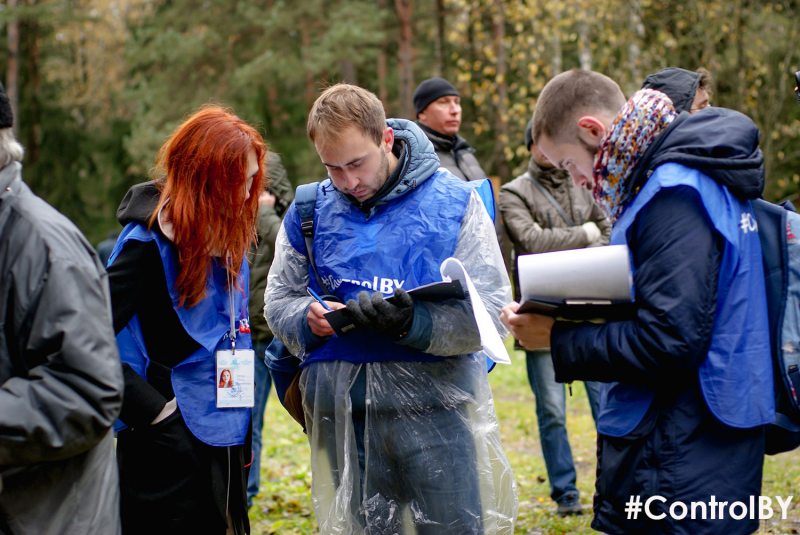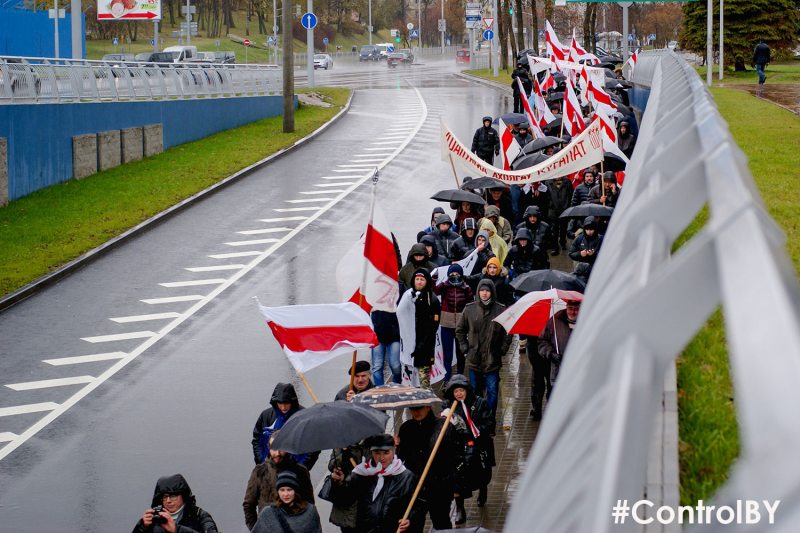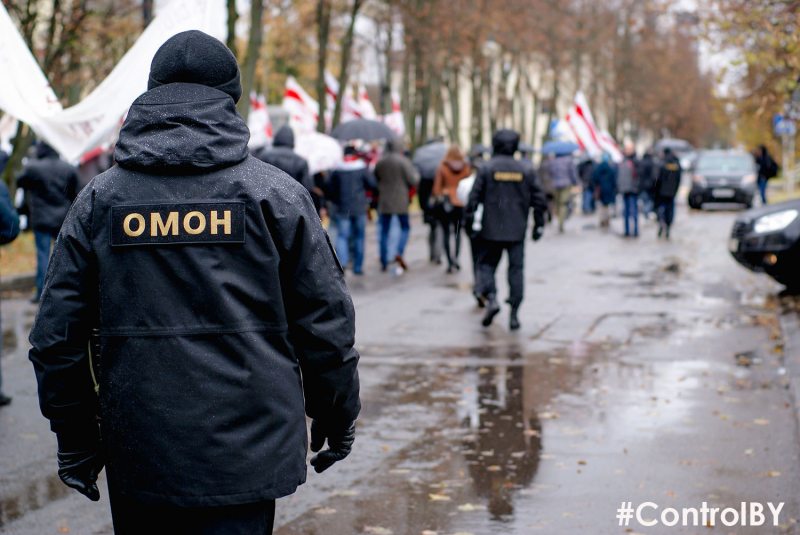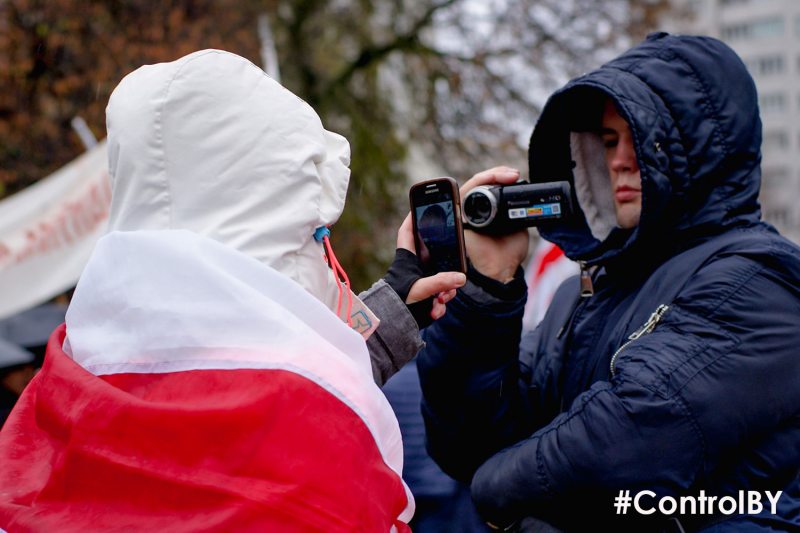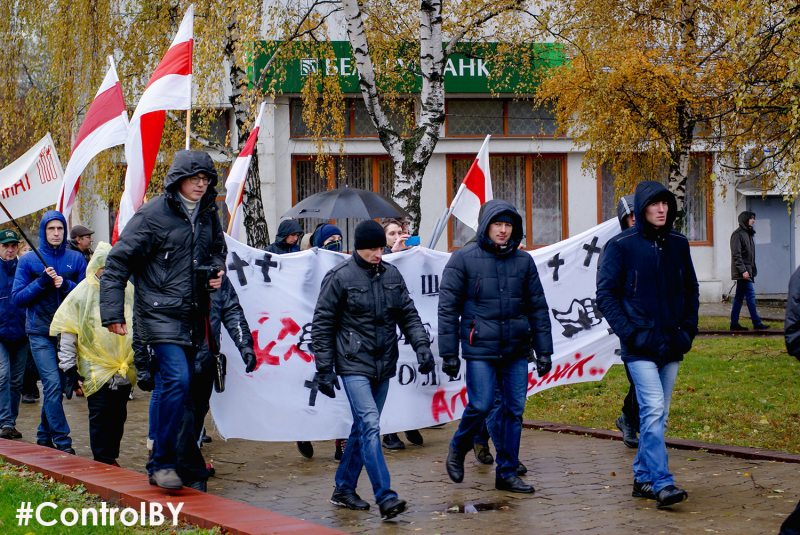Report on monitoring of the mass event Dziady in Minsk, October 30, 2016
Conclusions:
- The event was of peaceful character throughout the whole action (i.e. “when organizers have peaceful intentions and the assembly is of non-violent character”). Participants did not carry any weapon, did not shout calls for violent actions, and did not violate traffic rules.
- The necessity to obtain two permits to hold the action, and the demand to pay for services of state bodies can be interpreted as disproportionate restriction of the right to peaceful assembly.
- Employees of the police in plain-clothes unreasonably interfered with the right to free expression of part of the demonstrators, namely, they walked beside a banner shielding it when the column moved on.
- It should be noted that it was impossible to identify many employees of law enforcement agencies, as most of them did not wear uniform; employees in uniform lacked identity badges. There is no information that would justify such dress code, and the missing ID signs makes impunity possible in case of conflicts; this also disorients organizers and participants about whose assistance to seek in conflict situations.
- The positive moment was the police’s information group and their communication with monitors, however, from time to time they were absent from the place of the event and could not answer precisely some questions; sometimes, they declined to communicate with the monitors.
- The positive point was unhampered movement of the column while crossing Valhahradskaya Street, but meantime the column was split by traffic wardens at other crossroads.
Methodology of the monitoring
The Belarusian Helsinki Committee and the Human Rights Center Viasna have held systematic monitoring of mass events in Minsk for several years, applying consistent methodology. Volunteers are invited and taught the principles of citizen control, standards of peaceful assembly and methodology of monitoring; they are taught how to fill in the monitoring form on the spot during mass events, how to process the forms and make monitoring reports. The forms of monitoring mass events have been developed jointly by human rights organizations and touch upon aspects like: possibility to perform functions of monitors and mass media; behavior of organizers and of participants, the police; presence of emergency service. Volunteers are admitted to monitoring only with the commitment to comply with the rules and guidelines of the principles of monitoring (independence and political neutrality, description of facts, not opinions; noninterference with the events observed; adherence to the principles of law (restriction from any form of violent actions and discriminatory practices; correct behavior)). While monitoring, the monitors keep aside from participants of the demonstration. They have to be marked with badges and blue vests.
Preliminary information
Information about the traditional procession Dziady was disseminated widely on the web and social nets.
On October 30, 2016, seven trained observers monitored the event fully in person, marked with proper signs.
It is known that organizers of the action obtained permit from two establishments – the Minsk City Executive Committee and the Minsk Region Executive Committee, as the demonstration gathered in the territory of the city and proceeded to the outskirts of the city, the area Kurapaty. The requirement to obtain the permits, as well as the very procedure of obtaining permits essentially restrict the right to peaceful assembly. Besides, the authorities demanded from the organizers to conclude agreements and to pay for services of the police, emergency service and cleaning-up of the territory. These demands contradict to positive obligations of the state in the sphere of freedom of peaceful assembly.
The course of the mass event
- The mass event took place on October 30, from 10:40 am to 15:10 pm.
Participants had been gathering since 10:40, they formed a column, put up banners and placards and interacted. At 11:35 am, the column set off, coordinated by the organizers. The organizers were marked with badges and bandages on the sleeves. At 14: 25 pm the column reached Kurapaty where the commemorative meeting was held. At 15:00 pm the participants started leaving, in groups from 3 to 50 people.
- The number of participants was up to 200 people at peak time. First, the column consisted of around 130 people; 160 people were counted at the crossroads with Filimonava Street. 200 people were counted in the subway passage near Kurapaty.
- It was quite hard to identify how many representatives of law enforcement agencies were present. There were at least 10 traffic wardens at the crossroads along the movement of the column. At least 50 people were supposed to be officers in plain-clothes, carrying headphones and walkie-talkies. Representatives of the interior department of the city and local executive committees were also in plain-clothes without badges. At least six people were making video recording with small handheld cameras. Six officers of special security forces in black uniform OMON moved along with the column, without personal badges, though. There were two informational groups dressed in respective vests at the places of the beginning and the end of the demonstration.
- There were at least 12 representatives of the media who actively recorded the action for video and photo, talked to participants.
- There were no impediments to get to the place of the meeting by personal or public transport; no interference with work of the media and monitors.
- There were no calls for violent actions from organizers and participants.
- There were banners with the following phrases: “Long live independent Belarus”, “Conservative Christian Party BNF”, “Dziady”, “Commemorate victims of Kurapaty”, “Fascism has many colors, but the result…”
- The large banner “Fascism has many colors, but the result…” was first carried on the side of the column, but 5 – 7 young men walked beside and shielded the notice. Attempts to find out who the men were gave no result, so the column put up the banner on two flagpoles and moved on.
- The following symbols were used: white-red-white flags, white-red-white flags with the coat of arms Pahonia, white-red-white ribbons and ribbons with ornaments, the flag of Ukraine.
- The car of emergency service and a car with a camera accompanied the column all the way long.
- Organizers followed the law enforcements’ demand to observe traffic rules, did not split the column, waited for those far behind and coordinated the movement of the column.
- The protesters were allowed to move on at Valhahradskaya Street crossroads, for which the traffic was restrained; at Mirashnichenka Street the column split apart at the traffic lights.
- The following slogans were used: Long Live Belarus, Verym, mozham, pieramozham (We believe, we can, we’ll win). Organizers had a megaphone and sometimes sang songs in it.
Recommendations
To organizers:
* To ensure guards whenever possible and agree on maintenance of public order and unimpeded movement with the police.
To law enforcement agencies:
* All employees should carry out law enforcement at public events dressed in uniform and marked with identifications signs, like lapel badges;
* To communicate with monitors as with a third independent party;
* Not to split the movement of the column at crossroads and traffic lights;
* Disallow censorship of demonstrational materials of the column during the event.
To legislators:
* To propose amendments to legislation in order to bring it in compliance with international standards in the sphere of freedom of peaceful assembly.




